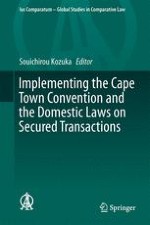2017 | OriginalPaper | Buchkapitel
7. The Cape Town Convention on International Interests in Mobile Equipment and Its Implementation in the Netherlands and on the Dutch Caribbean Islands
verfasst von : Sjef van Erp
Erschienen in: Implementing the Cape Town Convention and the Domestic Laws on Secured Transactions
Aktivieren Sie unsere intelligente Suche, um passende Fachinhalte oder Patente zu finden.
Wählen Sie Textabschnitte aus um mit Künstlicher Intelligenz passenden Patente zu finden. powered by
Markieren Sie Textabschnitte, um KI-gestützt weitere passende Inhalte zu finden. powered by
